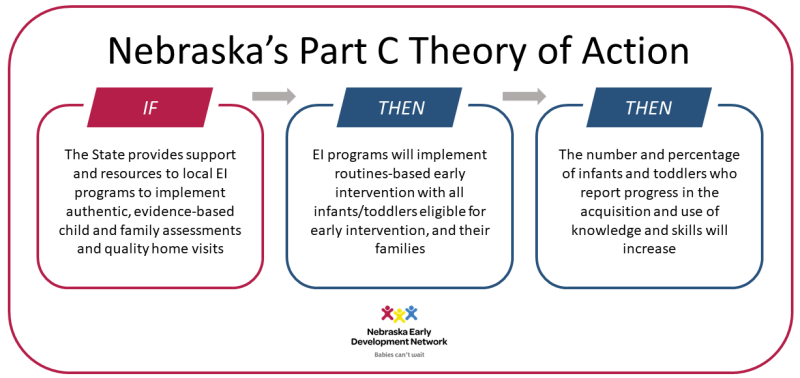Introduction to Results-Driven Accountability
Until 2014, the U.S. Department of Education’s primary focus was to determine whether states were “in compliance”—i.e. meeting procedural regulations such as timelines for referrals, evaluations, etc. While these compliance indicators were important, under a new framework known as Results-Driven Accountability (RDA) 2014-2019, the Nebraska Co-Lead Agencies began focusing on the implementation of evidence-based strategies to improve results and outcomes for students with disabilities—including infants, toddlers and their families.

Selection of Evidence-Based Strategies
A review of early intervention (EI) data in Nebraska in 2014 indicated a need to focus statewide efforts on implementation of evidence-based child and family assessment, aligning our child and family outcomes with family-identified needs and priorities, and providing supports and services within the context of family routines. Based on these needs, Nebraska began promoting a Routines-Based approach to Early Intervention (RBEI), which includes three improvement strategies:
(1) Using the Routines-Based Interview (RBI) as a child and family assessment tool,
(2) Writing functional child and family outcomes resulting from priorities identified through the interview process, and
(3) Providing quality routines-based home visits.
Over the past 5 years, providers and services coordinators across Nebraska have been trained in these practices and have found them to be extraordinarily helpful in the assessment of children and families, in the development of functional and meaningful IFSP’s, and in the provision of quality home visits based upon family routines. Nebraska has also seen a positive impact on family satisfaction with services due to the implementation of these strategies.
The focus on implementation of evidence-based practices versus “compliance” has been so successful that the timeline for implementation has been expanded by the Office of Special Education Programs (OSEP) for another 5-year cycle (2020-2025).
As a part of Results Driven Accountability (RDA), all states were required to develop a State Systemic Improvement Plan (SSIP) by April 1, 2015. The SSIP, which was to span 5 years, identified one or more State Identified Measurable Results (SIMRs) and one or more coherent improvement strategies that would positively impact the SIMR. Nebraska’s SIMR and coherent improvement strategies, identified in 2015 during the first 5-year RDA cycle, will continue into the second cycle beginning July 1, 2020.
Nebraska’s SIMR
Increase the number and percentage of infants and toddlers who demonstrate progress in the acquisition and use of knowledge and skills (including early language/communication) 3B, Summary Statement 1.
Nebraska’s 3 Coherent Evidence-Based Improvement Strategies
- Implementation of the Routines Based Interview (RBI) as the recommended child and family assessment process;
- Development of meaningful and measurable child and family outcomes using information obtained from the RBI, and
- Implementation of quality routines-based home visits.
The improvement strategies, as a unified set, are referred to as “Routines-Based Early Intervention” (RBEI) . Nebraska expects to see a positive effect on the SIMR when EI teams (1) fully implement an evidence-based child and family assessment (RBI); (2) use the priorities identified during the RBI to develop functional child and family IFSP outcomes based on everyday routines; and (3) implement routines-based home visits focused on meeting the child and family IFSP outcomes. The success of the evidence-based strategies are measured by their impact on child and family outcomes.
Support for Statewide Implementation of Evidence-based Practices/Strategies
In Nebraska, the Planning Region Team (PRT) is responsible for the implementation of the RDA strategies. There are 28 Planning Regions teams in the state. Nebraska utilized a cohort approach to scale-up the three improvement strategies.
RDA training on the RBI and functional outcomes began during the summer of 2014 with the identification of Cohort 1, comprised of PRT 1 (Wakefield), PRT 22 (Westside), and PRT 27 (North Platte). Quality home visit training, the third improvement strategy, was provided to PRTs 22 and 27 in 2017; with PRT 1 declining to participate. PRT 7 was substituted for PRT 1. PRTs 7, 22 and 27 are at full implementation of all three strategies.
RDA training on the RBI and functional outcomes continued during the summer of 2015 with the identification of Cohort 2, comprised of PRT 4 (Auburn), PRT 18 (Lincoln Public), PRT 19 (Omaha Public) and PRT 21 (Millard). Quality home visit training for Cohort 2 was provided in 2017. Cohort 2 regions are at full implementation of all three strategies as well.
RDA training for the non-pilot regions of the state is well underway- all non-pilot PRTs identified at least 2 of the 3 strategies for their PRT-wide improvement focus.
State Supporting Infrastructure
Over the past 5 years, Nebraska has developed infrastructure at state, regional and local levels to support the implementation of the improvement strategies. Each region of the state has a Technical Assistance (TA) provider to assist with information dissemination, training, coordination etc.
RDA Evaluation Processes
Implementation fidelity: RBI fidelity checks collected annually from Cohort regions, 10-20% of IFSPs from Cohorts analyzed annually using Quality Outcome Checklist, Cohort Getting Ready (GR) fidelity checks for quality home visits collected annually
Annual Family Survey: Increase rate of return and family satisfaction
Results Matter – GOLD: Data clean up and increase in SIMR
University-led Research Studies- The Co-Leads contract with the University of Nebraska- Lincoln; the University of Nebraska Medical Center – Munroe-Meyer Institute; and the University of Nebraska Omaha to conduct evaluation studies regarding the impact and effectiveness of the three improvement strategies.